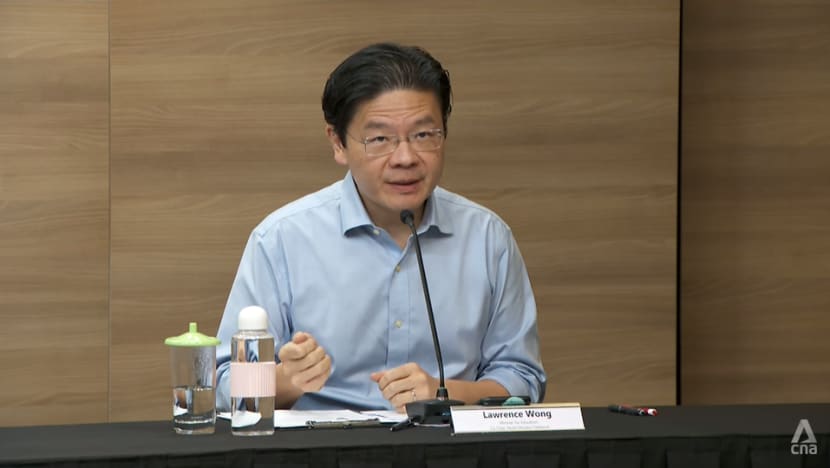commentary Commentary
Commentary: What if people don’t want to return to the office?
From Monday (Apr 5), more workers can head back into the physical office. But how ready are we to return to a pre-pandemic work life? The answer lies in how prepared bosses are in tackling different concerns.

People walk during their lunch break at the financial business district of Raffles Place in Singapore on Jan 11, 2021. (Photo: AFP/Roslan RAHMAN)
SINGAPORE: For anyone who has made that wholesale leap into work-from-home (WFH), it feels like forever since our last 9-to-5 office routine.
From scrambling to convert whatever spaces we could find into an office a year ago - whether a dining table, a sofa, or even the floor - most of us today have settled into a comfortable pattern.
Sure, there were myriad teething issues when the boundaries separating our personal and professional lives melted, turning some homes into a sideshow of horrors for parents with screaming kids.
Cabin fever and the lack of human interaction worsened disconnectedness. Self-discipline and motivation waxed and waned, making self-doubt seem like the only emotion in abundant supply on some days.
READ: Commentary: I’ve been career oriented my whole life, until the COVID-19 pandemic took my ambition
But fast forward to today, that nightmare has largely receded into the rearview mirror.
By and large, as children returned to schools, as communication tools like Zoom improved reach and reliability, and as we gained more degrees of freedoms with restrictions on gatherings, events and other economic activities easing when Singapore shifted into subsequent phases of our reopening, the outlook for WFH started to look pretty good.
Research has shown workers are more productive, more engaged and more loyal to their firms overall.
READ: Commentary: Please don’t end work from home. It’s not that bad
THE WORK-FROM-HOME PANDEMIC BOON
“Nothing can happen for decades and then decades can happen in weeks,” reads a quote famed New York University Professor Scott Galloway shared in his latest book Post Corona: From Crisis to Opportunity.
He describes what a radical transformation COVID-19 has wrought on the world of work, in forcing firms to jettison old mindsets to inevitable change.
Case in point: Flexible work arrangements, once vehemently resisted by controlling bosses and stuffy corporate norms, became the standard overnight.
The pandemic has also brought into sharper focus employee welfare. Goldman Sachs be darned, companies paid more attention to helping workers cope through this unprecedented disruption. Managers were expected to step up to demonstrate leadership.
READ: Commentary: Why do you not feel like working from home? You’re probably procrastinating more
We may have had initial doubts about this forced WFH experiment but many have since warmly welcomed it, all things considered. In fact, three in four now working from home say they do not wish to return, according to a Straits Times survey last week.
WORRIES ABOUT RETURNING TO WORK
But the pendulum may be swinging back to the other side. With the Singapore Government giving the green light for more to return to the office, firms are cranking up old engines and preparing to welcome back larger groups of workers come Monday (Apr 5).

Some forewarning was given in January when multi-ministry taskforce co-chair and Education Minister Lawrence Wong highlighted that 100 per cent work from home would not be doable in the long term, citing the benefits of face-to-face interactions for collaboration.
Yet, when I asked EngageRocket CEO Leong Chee Tung and HR strategist Adrian Tan how they felt about the prospects of heading back to the workplace last October on CNA’s Heart of the Matter podcast, their answers were telling.
“I would rather not,” Mr Tan said.
“(I’m) apprehensive but hopeful for new gains,” Mr Leong said.
READ: Commentary: Co-working spaces look pretty attractive right about now
Last year, when Singapore was striving to flatten the COVID curve, many workers were understandably keen to minimise external exposure to avoid catching the virus and spreading it to seniors, kids and other loved ones at home.
So building managers and employers made sure spaces are sufficiently disinfected, work stations are well distanced and offices conform to health and safety standards.
After all, workplaces were worryingly a source of outbreaks last summer when Europe reopened offices. In Singapore, a coronavirus cluster formed around a local construction office barely two months ago.
But given close-to-zero community cases today, the concerns workers may have over returning to the office may be even more intangible and personal.
Now we loathe the bane of rush-hour commute, the loss of newfound autonomy and the painful practicalities of having to wear a mask all day while at the office.
We have invested in home offices, better Internet connections and so much more to make WFH work.
WFH has also given workers more time on their hands to spend around family, familial chores and fresh air, while juggling work.
Must we really give it all back?
Listen to EngageRocket CEO Leong Chee Tung and HR strategist Adrian Tan debate the merits of returning to the office on CNA's Heart of the Matter podcast:
MANAGERS MUST TACKLE CONCERNS FROM WORKERS
Perhaps returning to the office has been a “first-world problem” for knowledge workers who had the luxury of staying home. After all, those on the frontlines in healthcare, transport, retail and other essential services had little say.
A middle ground can be found if workers are allowed to WFH on some days, but what if people do have issues with returning as frequently as their employer would like? “That will really be the litmus test of the kind of boss you have,” Mr Tan pointed out on our podcast.
The onus may be on workers to demonstrate they have delivered while working remotely and assuage managers performance will not be compromised with the continuation of such arrangements, he added.
READ: Commentary: Immobility during COVID-19 and its effects on our sleep, physical activity and well-being
Even then, will bosses really be willing to give exceptions, especially those in big corporations? How do they guard against the impression that special dispensation has been given if they accede to requests?
“Policies are guidelines,” Mr Leong said on the same episode. “Just because a company policy says everyone has to return to work on a particular day, it doesn’t mean a team manager cannot exercise discretion to allow some to stay home.”
He highlighted the critical role corporate leaders play in managing cases of people claiming unfair treatment and how trust might be at the heart of it all.
“This is the very challenge of management. The best companies I’ve spoken to understand this is not something that can be mandated from up high.”
“The best leaders trust their line managers and tell them this is your call, this is the guideline and the reason for the guideline. You’re the closest to your people, you make the decision,” he said.

To be sure, this paradigm shift towards flexible work may have crystalised when Twitter, Google, Facebook and more tech titans said they would allow employees to work from home forever and it will be hard to put the genie back into the lamp much as the rebalance towards the office has started.
In this, perhaps what firms really need is deft management.
One common complaint when Singapore pulled the circuit breaker almost exactly a year ago was how much workers wished their companies supported them better. They wanted better IT support, clearer guidance and more understanding of their personal challenges from bosses.
As the transition back to the office picks up steam, let’s hope employers have mastered those lessons learnt. How ready workers are to return to workplaces could depend on it.
Lin Suling is executive editor at CNA Digital News where she oversees the Commentary section and hosts the Heart of the Matter podcast.












